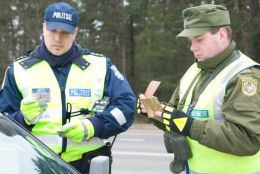Education and Science, Estonia, Forum, Legislation
International Internet Magazine. Baltic States news & analytics
Sunday, 31.08.2025, 08:54
Jõhvi and Narva policemen exchanged their language and work environment for a month
 Print version
Print version |
|---|
Since April, MISA has already supported the accommodation and work of 15 policemen in Rakvere, and five more policemen from Narva and Jõhvi will be sent to Rakvere or Iisaku in August, writes LETA.
The policemen that have changed their environment perform their regular police work during their assignment, but they are assisted by a specially appointed support person whose first language is Estonian.
Ilja Masljakov, a detective with the criminal investigation bureau at Jõhvi Criminal Investigations Department, admits that learning a new language at the age of 44 is not an easy task with the added problem of having very few opportunities to practice Estonian.
"We learn the Estonian language, but unfortunately there are very few opportunities to use Estonian in our region, and so, in order not to forget the language, I wanted to live for some time in another Estonian town where I will not hear Russian and have an opportunity to hear pure Estonian and to try talking with people," he said.
According to Masljakov, people in Ida-Viru County are quite often afraid of talking with Estonians in Estonian, and due to their limited vocabulary they are tempted to switch to Russian, because almost everybody understands Russian in Estonia.
"I gladly took the opportunity to live in Rakvere for a month, because although born in Estonia and having visited Rakvere with my family, living a month in this town gave me plenty of opportunities to stroll down small streets, talk to locals, and visit cosy, peaceful cafés and museums," added Masljakov.
He also visited Rakvere theatre, which he found useful, because in addition to interesting plays the actors use a good standard of language and pronunciation that really helps a language learner.
According to Piret Jõgi, the manager of AS TEA Keeleõpetus, which acts as a MISA partner in organizing language learning and supported the participants by providing learning materials, the policemen had to do various exercises individually or together with their support person. The Estonian language teacher also gave feedback on the completed exercises after their assignment.
Jõgi stresses that language learning during an assignment is not a traditional classroom lesson and the main emphasis is on intensive practice in the language environment. What makes this assignment project special is that the participants are accommodated in Estonian families where the policemen that wish to improve their skills have an opportunity to practice the official language even more.
"What the participants mainly needed was conversing in Estonian as much as possible to improve their language and professional knowledge. Based on the preliminary and final tests that have been delivered to us, we can say that Estonian language skills have improved, and almost all the participants stated on their feedback forms that they now have more courage to speak in Estonian," commented Jõgi.
The feedback showed that in addition to increased readiness to communicate in the other language the policemen felt stronger in daily and work-related vocabulary. The participants also discovered useful new professional knowledge and acquaintances, and several of them expressed their wish to go to Rakvere on an assignment in future.
"The feedback also revealed that such projects should be conducted at least once every six months and that the staff was friendly and helpful," added Jõgi.
The language learning of public sector employees is supported in the framework of the program Improving Language Learning 2011-2013 of the measure "Language Learning Development" of the priority axis "Lifelong Learning" of the European Social Fund "Human Resources Development Operational Plan". Language learning is granted to public sector authorities operating in the areas of security of society, public order.








 «The Baltic Course» Is Sold and Stays in Business!
«The Baltic Course» Is Sold and Stays in Business!

